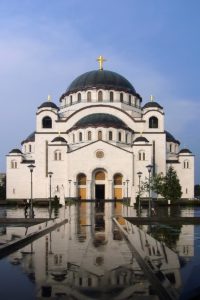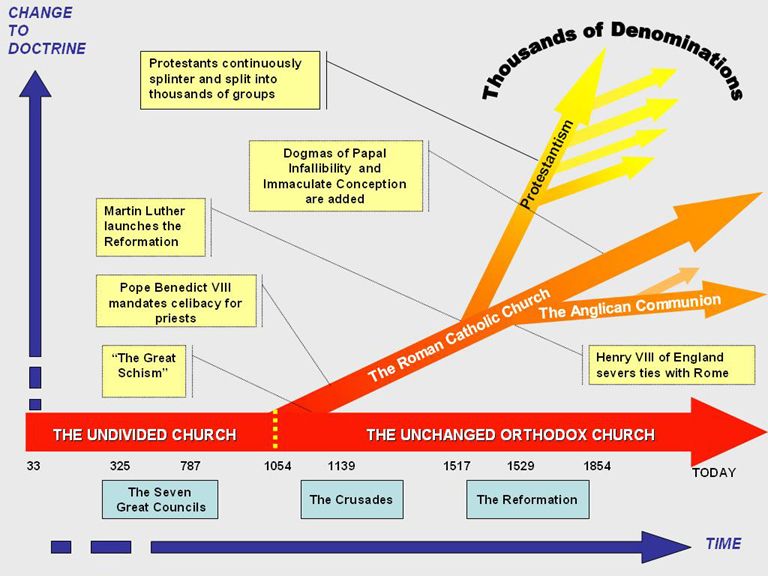by DAVID BROWN | CLEARNFO.com | July 19, 2023

The Cathedral of Saint Sava in Belgrade, Serbia
What we have here is a failure to comply!
Many Christians must feel abandoned by their church leaders as these leaders seek to harmonize debased social absurdities with core church principles. These social transformations include normalizing the killing of a baby in a mother’s womb and promoting countless sexual aberrations including child sexual mutilation. These changes are aimed squarely at recasting what was formally the traditional family into a mangled parody of its former self that is isolated, powerless, easily corruptible and controllable. Unsurprisingly, these destructive ideologies align nicely with social engineering efforts promoted by a philosophy of secular materialism whose endpoint is a single, unifying system of global governance — a scientific dictatorship. Despite many church leaders’ impulse to comply with these trends, the Christian Orthodox Church has remained remarkedly unchanged for over 2,000 years. Can Orthodoxy’s consistent and unbroken tradition serve as an effective teacher and a bulwark protecting sacred Christian doctrine against these self-inflicted detours into spiritual bondage and corruption?
Questions and Answers
What is Christian Orthodoxy?
What are the roots of Orthodoxy and what do they believe?
Why have there been so few changes in Christian Orthodoxy for over 2,000 years?
- Former atheist, James Perloff: I Have Joined the Eastern Orthodox Faith
- From Atheist to Orthodox Christian | My Testimony (Jasmyne Theodora)
- Former Protestant, Jay Dyer: Deconstructing Protestantism
- Former Jew, Brother Nathanael: 12-23-2012 – MY JOURNEY INTO THE ORTHODOX CHURCH
- Former Catholic: Life Testimony: Reader Paul – My Journey To Holy Orthodoxy
- My Journey To Orthodoxy (Righteous Rebellion) Sharing my journey with you as an Orthodox Christian women.
- Former Baptist: From Baptist to Orthodox {Why Did You Become Orthodox?} – John Maddex
- Wikipedia: Eastern Orthodox Church
- Orthodox Wiki
- Videos for Inquirers…
- An Overview of the Orthodox Divine Liturgy
- Top 10 Questions About Orthodox Christianity! – Jay & Jamie
- Ancient Faith Radio, music and podcasts
- New AFR App for your smartphone
- Ancient Faith on YouTube
- The Whole Counsel of God: An Introduction to Your Bible by Stephen De Young
- Orthodox Church in America
- Eastern Orthodoxy in North America
- Brief graphical timeline of church history
- RELIGIOUS PROCESSION IN BUCHAREST CLEANSES STREETS AFTER LGBT PARADE
Bucharest, August 2, 2023
Common questions:
- How many people are baptized members of Orthodoxy? ~225 million.
- Do Orthodox Christians worship Mary? No, they honor Mary.
- Do Orthodox Christians worship icons? No.
- Do Orthodox Christians worship saints? No, they honor saints.
- Do Orthodox Christians use the Old and New Testament? Yes. The Orthodox Study Bible is the English translation of the St. Athanasius Academy Septuagint edition for the Old Testament, and utilizes the New King James Version for the New Testament.
- Are Orthodox Christians the same as Roman Catholics? No. Roman Catholics are considered by many as the 1st Protestants since they reformed / broke away from the ancient tradition still practiced by Orthodoxy today.
- Are Orthodox Christians non-denominational? No, they are pre-denominational.
- Are the Orthodox considered to be a Christian denomination? No, Orthodox Christians are pre-denominational.
- Does the Orthodox Church have a pope? No. (Orthodoxy rejects the Pope’s claim to universal jurisdiction.) Orthodox view on Papal Supremacy.
- Does the Orthodox Church believe in The Nicene Creed? Yes.

A Consistent and Unbroken Tradition: Timeline Of Church History | The Roman Catholic Church added to Orthodoxy and the Protestants subtracted from Orthodoxy.
The Symbol of the Faith
Composed at the1st Ecumenical Council at Nicaea in 325,
And completed at the 2nd Ecumenical Council at Constantinople in 381.
THE NICENE CREED:
I believe in one God, Father Almighty, Creator of heaven and earth, and of all things visible and invisible.
And in one Lord Jesus Christ, the only-begotten Son of God, the only begotten, begotten of the Father before all ages; Light of Light, true God of true God, begotten, not made; of one essence[1] with the Father; through Whom all things were made.
For us men and for our salvation, He came down from heaven, and was incarnate of the Holy Spirit and the Virgin Mary, and became man. And He was crucified for us under Pontius Pilate, and suffered and was buried; And the third day He rose again, according to[2] the Scriptures. And ascended into heaven and sits at the right hand of the Father; And He shall come again with glory to judge the living and dead; whose kingdom shall have no end.
And in the Holy Spirit [3], the Lord, the Creator of life, Who proceeds from the Father[4], Who with the Father and the Son together is worshipped and glorified; Who spoke through the prophets.
In one, holy, catholic, and apostolic Church. I confess one baptism for the forgiveness of sins. I look for the resurrection of the dead, and the life of the age to come. Amen.
[1] or “consubstantial”
[2] or “in fulfillment of”
[3] At this point the original Creed of Nicaea 325 ended; the remainder was added at the 2nd Ecumenical Council in 381.
[4] Here the Roman Catholics add the Latin word Filioque, which means “and from the son.”
Definition of (lower case) catholic:
adjective
1. broad or wide-ranging in tastes, interests, or the like; having sympathies with all; broad-minded; liberal.
2. universal in extent; involving all; of interest to all. *
*’Know the Faith’ by Rev Michael Shanbour (pg. 37): Unfortunately, the word catholic is usually translated as “universal.” But the Greek word indicates fullness and completeness. St. Ignatius of Antioch, the first known to use the word, applies it to the local church: “Wherever the bishop appears, the whole congregation is to be present, just as wherever Jesus Christ is, there is the whole [catholic] Church.” (Ignatius, Epistle to the Smyrnaeans 7.2, in Apostolic Fathers, p. 113)
Thinking Orthodox | Understanding and Acquiring the ORTHODOX CHRISTIAN MIND
by Eugenia Scarvelis Constantinou. Ph.D.
More from ClearNFO:
Archbishop Carlo Maria Viganò Speaks at the Second Congress of the Intl Russophile Movement & the Multipolarity Forum in Moscow on February 26, 2024
